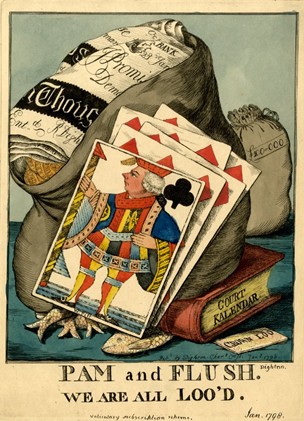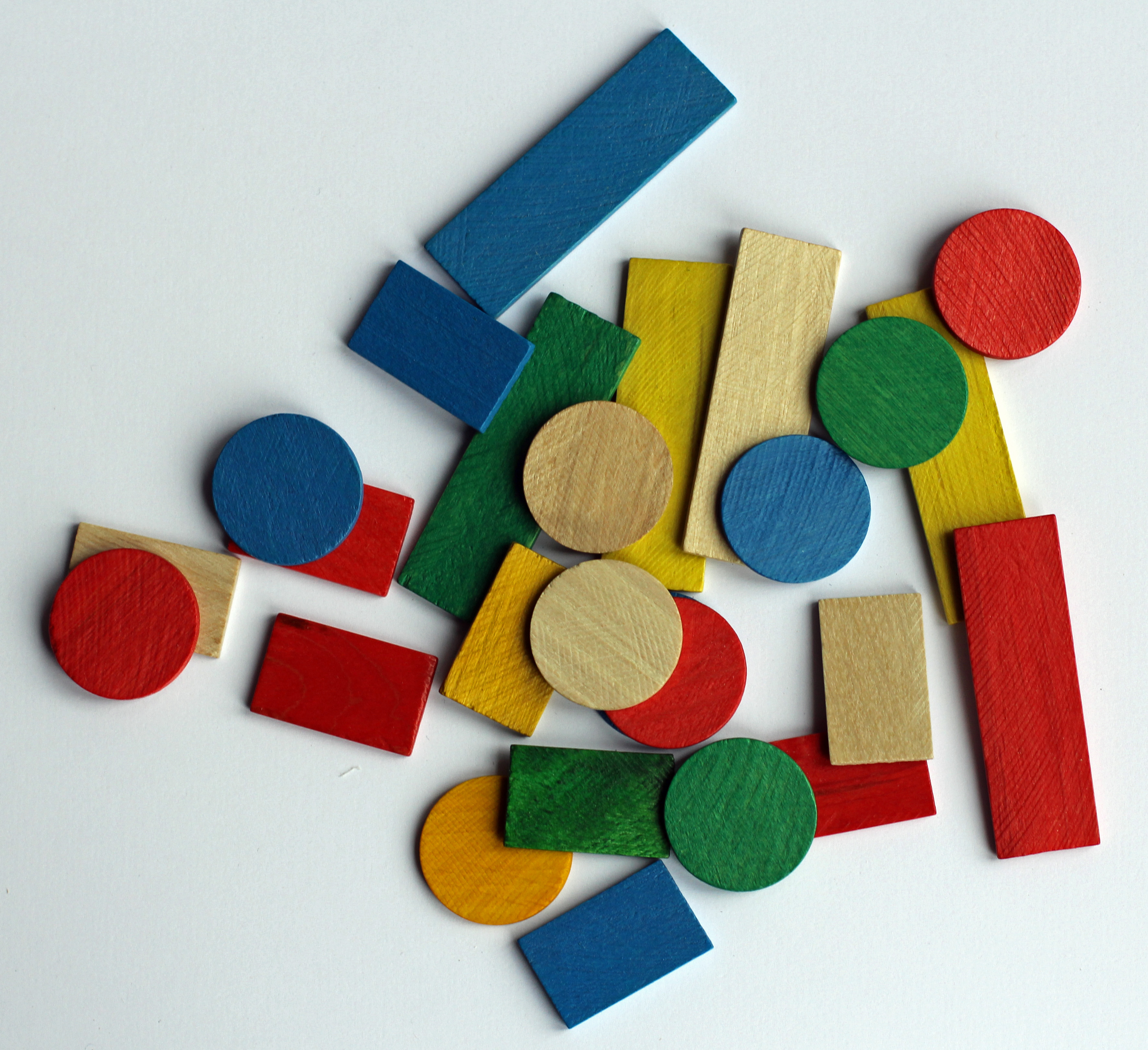|
Lanterloo
Lanterloo or Loo is a 17th-century trick taking game of the Trump family of which many varieties are recorded. It belongs to a line of card games whose members include Nap, Euchre, Rams, Hombre, and Maw (Spoil Five). It is considered a modification of the game of "All Fours", another English game possibly of Dutch origin, in which the players replenish their hands after each round by drawing each fresh new cards from the pack. History Under various spellings, like the French forms , , (meaning "fiddlesticks", a meaningless word equivalent to "Lullay", or "Lulloo", used in Lullabies), the game is supposed to have reached England from France most probably with the restoration of the monarchy in 1660. In France it was originally called ("Fly"), which was also the name of the five-card flush in that game and came to refer to the four-card flush in Lanterloo. Also called LangtrilloOnce a week, Vol. 10, pg. 364, Eneas Sweetland Dallas - Bradbury & Evans, London 1863 in its prime form ... [...More Info...] [...Related Items...] OR: [Wikipedia] [Google] [Baidu] |
Mistigri (card Game)
Mistigri, historically Pamphile, is an old, French, trick-taking card game for three or four players that has elements reminiscent of poker. It is a member of the Rams family of games and, although it is a gambling game, often played for small stakes, it is also suitable as a party game or as a family game with children from the age of 12 upwards. Name Mistigri is a variant of ''Mouche'' or ''Lenterlu'' and a cousin of the English Lanterloo. It is known in Germany as Mönch ("Monk"), possibly a corruption of the French ''Mouche'' as ''Monche'' was the old German for monk. Meyer certainly equates it to ''Mouche'', ''Lenturla'' and ''Pamphile'', while Grupp also states that it is known as ''Trente et un'' ("Thirty-One") in French, but Méry's research shows that Mistigri was derived from ''Mouche'' (which was also called ''Lenturlu'') and was first named ''Pamphile''. It is related to the historical card game of Tippen. The game is named after the "mistigri" (French for "pussy ... [...More Info...] [...Related Items...] OR: [Wikipedia] [Google] [Baidu] |
Mouche (card Game)
Mouche, also known as Lanterlu, is an old, French, trick-taking card game for two to six players which has elements, such as bluffing, reminiscent of the much later game of poker. It is a member of the Rams family of games and, although it is a gambling game, often played for small stakes, it is also suitable as a party game or as a family game with children from the age of 12 upwards. It is named after the ''mouche'', a term that variously refers to its winning hand, the basic stake and the penalty for failing to take any tricks. Although also called ''Bête'', it should not be confused with the older game of that name from which it came and which, in turn, was a derivative of Triomphe. History Mouche is first recorded in the ''Académie Universelle des Jeux'' of 1718, although Parlett implies that, from its terminology, it ought to be an ancestor of the English game, Lanterloo, which goes back at least to Cotton's rules of 1674, and that they are probably both descended from ... [...More Info...] [...Related Items...] OR: [Wikipedia] [Google] [Baidu] |
Bester Bube
Bester Bube ("Best Bower") or Fünfkart ("Five Cards") is an historical German card game for 3–6 players played with a Piquet pack. It is one of the Rams group of card games characterised by allowing players to drop out of the current game if they think they will be unable to win any tricks or a minimum number of tricks.''Card Games: Rams Group'' at www.pagat.com. Retrieved 16 Oct 2018 It may be an ancestor of Five-Card Loo. Names The game goes under a variety of dialectical names, some named after the top card the "Best Bower"; these include Bester Bube or Bester Bauer (High German); Bester Buern or Bester Buur ( ...[...More Info...] [...Related Items...] OR: [Wikipedia] [Google] [Baidu] |
Euchre
Euchre or eucre () is a trick-taking game, trick-taking card game commonly played in Australia, Canada, New Zealand, Great Britain, and the United States. It is played with a deck of 24, 28, or 32 standard playing cards. Normally there are four players, two on each team, although there are euchre game variations, variations for two to nine players. Euchre emerged in the United States in the early 19th century and, while there several theories for its origin, the most likely is that it derives from an old Alsatian game called Juckerspiel, Jucker. Euchre was subsequently responsible for introducing the Joker (playing card), joker into the modern deck of cards, first appearing in Euchre packs in the 1850s. Origins and popularity ''Eucre'' is briefly mentioned as early as 1810 by Piomingo, a Chickasaw chief, being played in a gaming house alongside All Fours (card game), all fours, loo (card game), loo, cribbage and whist. In 1829, ''uker'' was being played with ''bowers'' on a s ... [...More Info...] [...Related Items...] OR: [Wikipedia] [Google] [Baidu] |
Tippen
Tippen, also known as Dreiblatt, Dreikart, Drei Karten, Dreekort, Kleinpréférence or Labet, is an historical German 3-card, plain-trick game which was popular as a gambling game for three or more players. The Danish version of the game was known as Trekort and more elaborate Swedish variants include Knack and Köpknack. It appears to be related to the English game of 3-Card Loo. It was banned as a gambling game in some places. History and etymology The game was described in 19th century anthologies and encyclopedias but appears related to 3-card Loo, which was already described in the 18th century. In some locations the game was illegal. Dreiblatt is recorded as early as 1807 as a gambling game in which players received three cards, and Tippen is mentioned in 1790 as a gambling game similar to Grobhäusern and Trischak,Förster, Thomas (1790), ''Thomas Försters Erzählungen von seinen Reisen in allen vier Welttheilen.'' Vol. 1. Weißenfels: Friedrich Severin. p. 199. and i ... [...More Info...] [...Related Items...] OR: [Wikipedia] [Google] [Baidu] |
Napoleon (card Game)
Napoleon or Nap is a straightforward trick-taking game in which players receive five cards each and whoever bids the highest number of tricks chooses trumps and tries to win at least that number of tricks. It resembles a simplified version of Euchre and has many variations throughout Northern Europe. The game has been popular in England for many years, and has given the language a slang expression, "to go nap", meaning to take five of anything. It may be less popular now than it was, but it is still played in some parts of southern England and in Strathclyde. Despite its title and allusions, it is not recorded before the last third of the nineteenth century, and may have been first named after Napoleon III.Parlett (1990), p. 163 History Rules for Napoleon, "a very spirited and interesting game", were first published in England in 1876.Heather (1876), pp. 155–157. Another, shorter, rule set appeared in 1882 when it was described as "comparatively new" but "exceedingly interesti ... [...More Info...] [...Related Items...] OR: [Wikipedia] [Google] [Baidu] |
Rams (card Game)
Rams is a European trick-taking card game related to Nap and Loo, and may be played by any number of persons not exceeding nine, although five or seven make a good game. In Belgium and France, the game of Rams is also spelt Rammes or Rems, in Germany, Rams, Rammes, Ramsch, Ramschen, Ramscheln or Ramsen, in Austria, Ramsen and Ramschen, and, in America, Rounce. The basic idea is fairly constant, but scoring systems vary. It was a widespread European gambling and drinking game that is still popular today. During the 19th century, it was introduced as Rounce in America and played with a 52-card deck without any difference between simples and doubles and with no General Rounce announcement. In the modern German variety of the game, Ramscheln, the 7 is the second best trump ranking next below the ace. History Parlett describes Rams as a "nineteenth-century French, Alsatian and Belgian" pastime, representative of a "very loose-knit group of gambling and drinking games". In fact, a ... [...More Info...] [...Related Items...] OR: [Wikipedia] [Google] [Baidu] |
Eric Partridge
Eric Honeywood Partridge (6 February 1894 – 1 June 1979) was a New Zealand– British lexicographer of the English language, particularly of its slang. His writing career was interrupted only by his service in the Army Education Corps and the RAF correspondence department during World War II. Early life Partridge was born in the Waimata Valley, near Gisborne, on the North Island of New Zealand to John Thomas Partridge, a grazier, and his wife Ethel Annabella Norris. In 1908 the family moved to Queensland, Australia, where he was educated at the Toowoomba Grammar School. He studied classics and then French and English at the University of Queensland. During this time Partridge also worked for three years as a schoolteacher before enrolling in the Australian Imperial Force in April 1915 and serving in the Australian infantry during the First World War, in Egypt, Gallipoli and on the Western Front, before being wounded in the Battle of Pozières. His interest in slang a ... [...More Info...] [...Related Items...] OR: [Wikipedia] [Google] [Baidu] |
Commanding Card
The following is a glossary of terms used in card games. Besides the terms listed here, there are thousands of common and uncommon slang terms. Terms in this glossary should not be game-specific (e.g. specific to Bridge, Hearts, Poker or Rummy), but apply to a wide range of card games. For glossaries that relate primarily to one game or family of similar games, see Game-specific glossaries. A ; Ace # The card with one pip in a pack of cards. Usually the highest card of a suit, ranking immediately above the King. May also occupy the lowest rank. # Commonly refers to the Deuce or Two in German-suited packs which don't have real Aces. Often the highest card of a suit. ; Acorns : One of the four suits in a German-suited pack of cards. Symbol: ; active # A card that is in play i.e. not sleeping. # See active player. ; active player # A player who receives cards in the current deal (i.e. is not sitting out because there are more players than the game is designed for a ... [...More Info...] [...Related Items...] OR: [Wikipedia] [Google] [Baidu] |
Whist
Whist is a classic English trick-taking card game which was widely played in the 18th and 19th centuries. Although the rules are simple, there is scope for strategic play. History Whist is a descendant of the 16th-century game of ''trump'' or ''ruff''. Whist replaced the popular variant of ''trump'' known as ruff and honours. The game takes its name from the 17th-century ''whist'' (or ''wist'') meaning ''quiet'', ''silent'', ''attentive'', which is the root of the modern ''wistful''. According to Daines Barrington, whist was first played on scientific principles by a party of gentlemen who frequented the Crown Coffee House in Bedford Row, London, around 1728. Edmond Hoyle, suspected to be a member of this group, began to tutor wealthy young gentlemen in the game and published ''A Short Treatise on the Game of Whist'' in 1742. It became the standard text and rules for the game for the next hundred years. In 1862, Henry Jones, writing under the pseudonym "Cavendish", pu ... [...More Info...] [...Related Items...] OR: [Wikipedia] [Google] [Baidu] |





